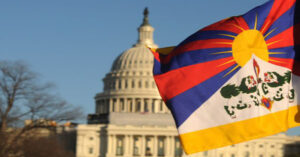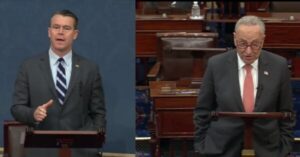 The United States’ Senate passed a bipartisan bill with majority vote of 68-32 on June 8 to boost their ability to compete in the technological advancement of China and other countries. The bill reiterates the US government’s continued and long tradition of strong and bipartisan support for the Tibetan people over the years.
The United States’ Senate passed a bipartisan bill with majority vote of 68-32 on June 8 to boost their ability to compete in the technological advancement of China and other countries. The bill reiterates the US government’s continued and long tradition of strong and bipartisan support for the Tibetan people over the years.
The US Innovation and Competition Act allocates an investment of US$250 billion to technological science and research to tackle the threat posed by China in terms of economic and political competition.
The bill establishes new US policy on Tibet which includes the appointment of a Special Coordinator for Tibetan Issues, either by the President with the advice and consent of the Senate, or an individual who already holds the rank of undersecretary or above. The International Campaign for Tibet* (ICT) reports that there has been a position of Special Coordinator for Tibetan Issues in the State Department since 1997, however towards the end of Trump administration a lower level official was appointed to the job.
The bill also opposes China’s interference in His Holiness the Dalai Lama’s succession, saying “interference by the Government of the People’s Republic of China or any other government in the process of recognising a successor or reincarnation of the 14th Dalai Lama and any future Dalai Lamas would represent a clear abuse of the right to religious freedom of Tibetan Buddhists and the Tibetan people”, and warns of sanctions. The US policy emphasises that only the Dalai Lama and the Tibetan people can decide on the Dalai Lama’s succession.

Sens. Chuck Schumer, D-N.Y., and Todd Young, R-Ind., speak on the Senate floor on June 8, 2021 as the chamber passed a bill they helped introduce, the US Innovation and Competition Act
The new bill provides for the setting up of a Tibet Unit within the Political Section of the US Embassy in Beijing until the US Chengdu Consulate is restored, or when a US Lhasa Consulate is created. The bill mandates, “The Secretary shall assign not fewer than two United States direct-hire personnel to the Tibet Unit and hire not fewer than one locally engaged member for such unit”.
The bill calls for additional sanctions related to China’s genocide of the Muslim ethnic minority Uyghur population of East Turkestan (Ch: Xinjiang) in north western China, and bans US officials from attending the 2022 Winter Olympics in Beijing.
“This bill shows once again that Tibet has become a core interest of the United States as it looks toward the future of global competition. From protecting the spiritual legacy of the Dalai Lama, to raising the status of the special coordinator, to creating a new Tibet unit in the embassy in Beijing, the Innovation and Competition Act lays out key policies addressing how China uses its control of Tibet to advance its global ambitions. We thank the Senate for passing this bill to help the people of Tibet and protect America’s interests,” said ICT
In response, Republic World quotes Wang Wenbin, a spokesperson of Chinese Foreign Ministry, rejecting the US bill and saying it “advocates strategic competition” and “smears China’s development path and both domestic and foreign policies”. It also alleges that the bill seriously interferes in the China’s internal affairs.
*The International Campaign for Tibet (ICT) is a nongovernment advocacy group working to help Tibetans in their peaceful struggle for democracy and human rights and seek to preserve Tibet’s ancient culture of wisdom.




 Print
Print Email
Email